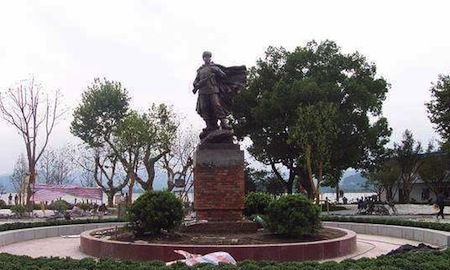|
||||||||||
|
ARTICLESStark Contrast: Kim Jong-il and Václav Havel Shades at West LakeGeremie R. BarméAs we have noted in previous issues of China Heritage Quarterly, 2011 was a year that marked the formal end to Chinese dynastic autocracy. Our September edition, Issue 27, focused on the Xinhai Year of 1911. In this issue focused on West Lake we have also noted the impact on revolutionary change over the twentieth centry brought to China. At times that change was short lived, or rather autocratic practice found renewed expression.  Fig.1 Army Volunteer, a statue on the shore of West Lake, Hangzhou, commemorating Chinese support for the Korean Communist forces during the Korean War As the parklands and sites around West Lake were redesigned from 2001, certain features that harked back to an earlier revolutionary-patriotic age remained unchanged. One of the most prominent of these is the statue of a soldier with a flying cape on a high plinth on the eastern shore of the Lake that has stood there since 1954. It represents the support of the newly founded People's Republic of China for the Communist forces in Korea during the conflict with US-led UN forces in the early 1950s. The gun-toting statue, Army Volunteer (Zhiyuanjun 志愿軍) stands in pride of place on the lakeside, although now it surveys new hotels and boutiques that international luxury designer products, from clothing to cars. On 17 December 2011, the North Korean leader Kim Jong-il (born Yuri Irsenovich Kim, 1941-2011), General Secretary of the Workers' Party of Korea, died in Pyongyang. Officially China viewed Kim Jong-il as a patriot determined to see the reunification of his motherland under socialism. No matter how strategically irksome and economically draining, Kim's sentiment was always lauded and his cause always acknowledged. This is as true for the incoming leaders like Xi Jinping, whose father Xi Zhongxun had been closely involved with China's support for Korea in the early 1950s, as it was for his predecessors. For many Chinese of a certain generation and background, a trip to Pyongyang had become a nostalgia tour, a visit promising an admixture of humour with horror, and a reprise of grim memories of China's own Maoist era. We mark the passing of Kim Jong-il, and the memory of Mao Zedong, by providing here a link to a review-essay entitled 'I'm So Ronree'. The day after the passing of the Korean autocrat, Václav Havel (1936-2011), a writer and public figure with an entirely different history and reputation, passed away in the Czech Republic. For the Chinese authorities and propagandists, Havel represented the outcome of an inimical Western strategy to pursue the 'peaceful evolution' of socialist countries into modern parliamentary democracies. Havel was a surrogate for the bourgeois West, for the machinations of global capital which under the guise of faux democracy and human rights tirelessly pursues dreams of market domination and political submission. Above all, the propagandists argue, Havel was an example of what happens when the threat of 'peaceful evolution' (heping yanbian 和平演变) is successful. China's own struggle against the corroding ideas of the West as formulated by US State Department Secretary John Foster Dulles as a strategy of 'peaceful evolution', what as early as 1949 Mao Zedong had called 'sugar-coated bullets' (tangyi guozhede paodan 糖衣裹着的炮弹), was formally launched in November 1959. Again, this is relevant to our account of West Lake, for as we have noted in a previous issue of China Heritage Quarterly it was at the Dahua Hotel (大華賓館) on West Lake, not far from the statue of the Army Volunteer, that Mao Zedong spoke of the long-term threat of 'peaceful evolution' to the Chinese party-state (see Qiang Zhai, '1959: Preventing Peaceful Evolution') The contrasting reactions to the passing of Kim and Havel in China have been widely noted. They reflect the disconnect between an official China and the boisterous online society that has burgeoned in recent years. Here we offer a digest of articles by Chinese thinking men and women on the passing of Havel produced by the Hong Kong site 1510.
|